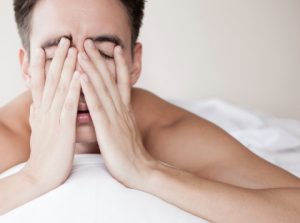
Waking up suddenly because you cannot breathe–this is not normal, and it often signifies a harmful health condition called sleep apnea. Natick dentist, Dr. Christina Papageorgiou, offers treatment for this sleep disorder so patients rest and have the vibrant health they deserve.
Symptoms of Sleep Apnea
Dr. Papageorgiou has patients who say they snore loudly and constantly–so much so that their spouses, children, or roommates can’t sleep. Even more significantly, these individuals exhibit other symptoms. Together, they may signify a sleep disorder called sleep apnea–literally, no breathing while sleeping. What does this sleep disorder look like?
Symptoms of sleep apnea include:
- Sudden waking multiple times per night
- Gasping for breath
- Measurable oxygen deprivation
- Morning headaches and irritability
- Inability to concentrate
- Memory issues
- Daytime fatigue and drowsiness
Beyond these daily problems, sleep apnea poses long-ranging health dangers such as increased risk for Type-2 diabetes, stroke, hypertension, heart attack, erectile dysfunction and more.
While individuals of all ages may suffer from sleep apnea, men over 40 and people with large neck circumferences or enlarged tonsils and sinus tissue seem more prone.
Types of Sleep Apnea
According to the National Sleep Foundation, sleep apnea falls into three categories:
- Obstructive Sleep Apnea, or OSA, caused by the collapse of soft tissues over the back of the throat, leading to blockage of the airway
- Central Sleep Apnea, or CSA, caused by poor communication between the brain and the respiratory system
- Mixed Sleep Apnea, a combination of OSA and CSA
A trained sleep physician tests and diagnoses people who exhibit signs of sleep apnea and prescribes lifestyle therapies and other interventions to reduce or eliminate symptoms. They often conduct an in-office or at-home sleep study in which the patient’s vital signs and activity levels are monitored during a typical night’s sleep.
Stop Snoring in Natick
Very mild sleep apnea often responds to lifestyle changes such as losing weight, sleeping on one’s side, elevating the head on pillows and not eating past mid-evening. Additionally, smoking cessation and limiting alcohol intake helps.
Beyond these common sense interventions, sleep physicians frequently prescribe CPAP, or Continuous Positive Airway Pressure. Using a bedside machine, the patient receives a steady stream of oxygen via a facial mask. Unfortunately, some individuals have difficulty adjusting to the sound of the CPAP machine and/or to wearing the mask continuously through the night. That’s where a sleep dentist, such as Dr. Christina Papageorgiou, comes in.
Oral Appliance
The team at Papageorgiou Dental Associates helps sleep apnea patients achieve the rest and health they deserve. Dr. Papageorgiou works with the primary care physician and sleep physician to pinpoint the best treatment for sleep apnea.
A custom-made oral appliance, made from comfortable acrylic, frequently is used as the single therapy or in conjunction with CPAP to open the airway and eliminate snoring and episodes of apnea. A “snore guard” positions the lower jaw in a more forward position which keeps the airway open and oxygen flowing.
Do You Snore?
This annoying noise may signal dangerous sleep apnea. If you or your loved ones are concerned about your snoring, contact Papageorgiou Dental Associates for a sleep apnea evaluation. Your long-term health may depend on it.

